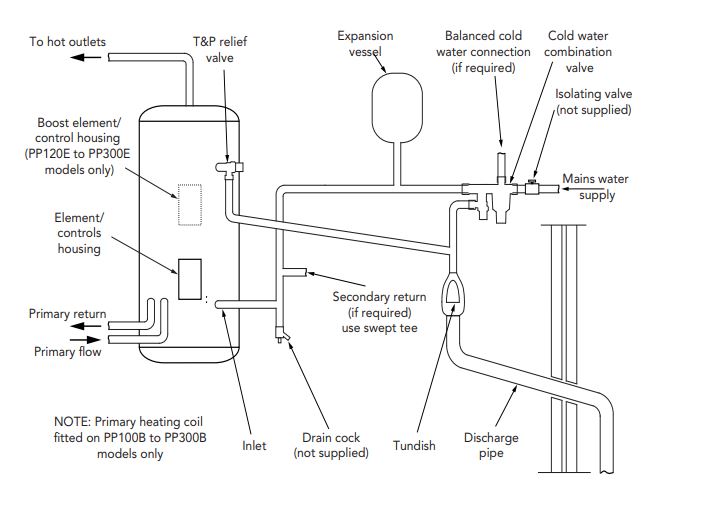The content of this blog was done in 2017

I have always struggled with water temperature control on my Trevi CTV thermostatic shower valve, typically it was always too cold and we ended up running the cold sink tap at the same time as having a shower, in order to reduce the cold water pressure, this then allowed warm water flow.
My first thought was that the problem was within the mixer tap, I downloaded the manual and disassembled the mixer to check that the hot water strainer was clear and nothing obvious was wrong, what I did notice was the temperature limiting plastic ‘stops’ were missing.
These ‘stops’ are a means of maximum temperature regulation and also act as an ‘anti scold’ devices, so the removal of them meant the installer knew of a problem 🙁
I went on the UK Plumbers Forum to ask advise about this and the answer came back almost immediately.
In order to explain, I need to show how my domestic hot water is plumbed:

Looking at the diagram above, the high pressure mains water supply enters from the right into a balancing valve, this valve performs three functions:
- Reduces the incoming cold water pressure to 3.5 bar to feed the unvented cylinder
- Provides a cold water connection at the same water pressure as the unvented cylinder
- Contains a Pressure Relief Valve which will discharge to drain if the pressure exceeds 6 bar.

Monoblock/Balancing valve.
My unvented cylinders reducing valve doesn’t have a cold water take off, so instead of fitting one, the original installer simply took the cold fee to the mixer shower valve directly from the incoming supply, which is at a greater pressure than the pressure reduced hot water, so it would never have worked properly from day one.
The person who fitted it must have known this, so removed any overtemperature controls, what an idiot!
In order to fix this, I needed to either fit a balancing valve and re-pipe the shower to the cold take off, or, fit a 3.5bar pressure reducing valve (PRV) near the shower, this is what I did.

The plastic pipes from the shower mixer run under the landing floor, so I used a multitool and cut an access hatch in the floor to locate the pipes, turning on the shower for hot water whilst holding the pipes, soon identified the hot one.
The PRV needed to be fitted to the cold water, so the stopcock wat turned off and water drained by turning on the kitchen taps, once drained the plastic pipe was cut and inserts fitted.
I used a short length of 15mm copper pipe tails from the PRV inlet and outlet compression fittings and made the connection to copper/plastic pipe with ‘push fit’ sockets.
The hatch cover was then screwed down and marked up, so anyone lifting the carpet back will know what’s under the hatch.
It was not an expensive fix, and its made a huge difference, don’t know why I put it off for so long.

